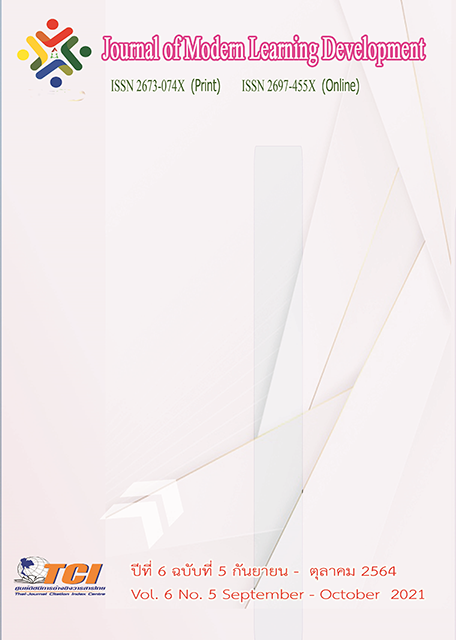The Impact of Extensive Reading on Thai Primary School Children’s Vocabulary Knowledge
Main Article Content
Abstract
The present study aimed to investigates the impact of extensive reading (ER) in Thai primary school EFL students’ vocabulary knowledge and students’ attitudes towards extensive reading(ER). The participants were twenty primary school learners, aged between 10-12 years old, at an opportunity extended school in the Northeastern part of Thailand. They were selected using voluntary participation. The students’ native language was Thai, and they had approximately three hours of English language a week. Moreover, none of the students had previously studied English with native English teachers. The research instruments consisted of the Vocabulary Knowledge Scale (VKS) test, a reading attitude questionnaire and reading report. All participants were requested to read ten graded readers during a ten-week reading program. The quantitative data were analyzed using means, standard deviation and percentage, while the qualitative data were coded into themes based on ER principles.
The results showed that participants’ receptive and productive vocabulary knowledge improved after the 10-week implementation of ER and Primary school participants’ attitudes toward ER (graded readers) were also positively increased. Overall, the current findings reveal the benefits of ER for vocabulary growth and attitudes toward reading. Other implications in light of pedagogical and methodological practice are also discussed.
Article Details
References
Alahirsh, H. (2014). Exploring the effectiveness of extensive reading on incidental vocabulary acquisition by EFL learners: an experimental case study in a Libyan University (Doctoral dissertation, University of Nottingham).
Csikszentmihalyi, M., & Csikzentmihaly, M. (1990). Flow: The psychology of optimal experience (Vol. 1990). New York: Harper & Row.
Day, R. R., Bamford, J., Renandya, W. A., Jacobs, G. M., & Yu, V. W. S. (1998). Extensive reading in the second language classroom. RELC Journal, 29 (2), 187-191.
Day, R., & Bamford, J. (2002). Top ten principles for teaching extensive reading. Reading in a foreign language, 14 (2), 136-141.
Day, R. R. (2004). Extensive reading activities for teaching language. Cambridge: Cambridge University Press.
Ellis, N. C. (2008). Implicit and explicit knowledge about language. Encyclopedia of language and education, 6, 1-13.
Fowle, C. (2000). Projects with Young Learners. Modern English teacher, 9 (3), 83-84.
Grabe, W. (2009). Reading in a second language: Moving from theory to practice. New York, NY: Cambridge University Press.
Hagley, E. (2017). Extensive Graded Reading with Engineering Students: Effects and Outcomes. Reading in a Foreign Language, 29 (2), 203-217.
Hayashi, K. (1999). Reading strategies and extensive reading in EFL classes. RELC Journal, 30 (2), 114-132.
Huffman, J. (2014). Reading rate gains during a one-semester extensive reading course. Reading in a Foreign Language, 26 (2), 17-33.
Krashen, S. D. (2004). The power of reading: Insights from the research (2nd ed.), Portsmouth, NH: Heinemann.
Krashen, S., Lee, S., & Lao, C. (2018). Comprehensible and compelling: The causes and effects of free voluntary reading. Santa Barbara, CA: Libraries Unlimited
McLean, S., & Rouault, G. (2017). The effectiveness and efficiency of extensive reading at developing reading rates. System, 70, 92-106.
McQuillan, J. (2019). Where do we get our academic vocabulary? Comparing the efficiency of direct instruction and free voluntary reading. The Reading Matrix: An International Online Journal, 19 (1), 129-138.
Nakanishi, T. (2015). A meta-analysis of extensive reading research. TESOL Quarterly, 49 (1), 6-37.
Nell, V. (1988). The psychology of reading for pleasure: Needs and gratifications. Reading Research Quarterly, 6-50.
Schmitt, N., & Meara, P. (1997). Researching vocabulary through a word knowledge framework: Word associations and verbal suffixes. Studies in second language acquisition, 17-36.
Suk, N. (2016). The effects of extensive reading on reading comprehension, reading rate, and vocabulary acquisition. Reading Research Quarterly, 52 (1), 73-89.
Takase, A. (2007). Japanese high school students' motivation for extensive L2 reading. Reading in a foreign language, 19 (1), 1-18.
Webb, S., & Chang, A. C. (2015). Second language vocabulary learning through extensive reading with audio support: How do frequency and distribution of occurrence affect learning? Language Teaching Research, 19 (6), 667-686.
Yamashita, J. (2013). Effects of extensive reading on reading attitudes in a foreign language. Reading in a foreign language, 25 (2), 248-263


